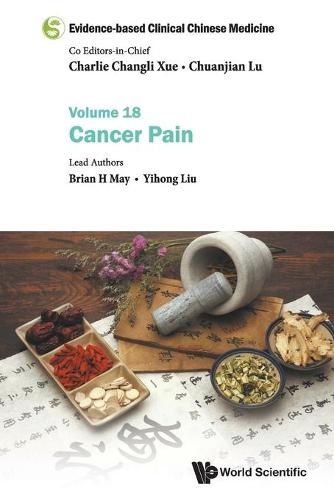Readings Newsletter
Become a Readings Member to make your shopping experience even easier.
Sign in or sign up for free!
You’re not far away from qualifying for FREE standard shipping within Australia
You’ve qualified for FREE standard shipping within Australia
The cart is loading…






This title is printed to order. This book may have been self-published. If so, we cannot guarantee the quality of the content. In the main most books will have gone through the editing process however some may not. We therefore suggest that you be aware of this before ordering this book. If in doubt check either the author or publisher’s details as we are unable to accept any returns unless they are faulty. Please contact us if you have any questions.
This eighteenth volume of the Evidence-based Clinical Chinese Medicine series aims to provide a multi-faceted ‘whole evidence’ analysis of the management of pain due to a range of cancers (cancer pain) using integrative Chinese medicine.Beginning with an overview of how cancer pain is conceptualised and managed in conventional medicine, the authors then summarise the differential diagnosis and managment of cancer pain in contemporary Chinese medicine based on clinical guidelines and contemporary books. The third chapter provides detailed analyses of how cancer pain and related disorders were treated with herbal medicine and acupuncture in past eras based on the classical Chinese medical literature.The subsequent chapters comprehensively review the current state of the clinical trial evidence for the integrative application of Chinese herbal medicines (Chapter 5), acupuncture (Chapter 7), other Chinese medicine therapies (Chapter 8) and combination Chinese medicine therapies (Chapter 9) in the management of cancer pain, as well as analyse and evaluate the results of these studies from an evidence-based medicine perspective. Chapter 6 reviews and summarises experimental evidence for the bioactivity of commonly used Chinese herbs and their constituent compounds. The outcomes of these analyses are summarised and discussed in Chapter 10 which alsoidentifies implications for the clinical practice of Chinese medicine and for future research.This book can inform clinicians and students in the fields of integrative medicine and Chinese medicine regarding contemporary practice and the current evidence base for a range of Chinese medicine therapies used in the management of cancer pain, including herbal formulas and acupuncture treatments, in order to assist clinicians in making evidence-based decisions in patient care. It also provides researchers with a comprehensive summary of the state of the field than can inform future.The following features mark the importance of this book in the field:
$9.00 standard shipping within Australia
FREE standard shipping within Australia for orders over $100.00
Express & International shipping calculated at checkout
This title is printed to order. This book may have been self-published. If so, we cannot guarantee the quality of the content. In the main most books will have gone through the editing process however some may not. We therefore suggest that you be aware of this before ordering this book. If in doubt check either the author or publisher’s details as we are unable to accept any returns unless they are faulty. Please contact us if you have any questions.
This eighteenth volume of the Evidence-based Clinical Chinese Medicine series aims to provide a multi-faceted ‘whole evidence’ analysis of the management of pain due to a range of cancers (cancer pain) using integrative Chinese medicine.Beginning with an overview of how cancer pain is conceptualised and managed in conventional medicine, the authors then summarise the differential diagnosis and managment of cancer pain in contemporary Chinese medicine based on clinical guidelines and contemporary books. The third chapter provides detailed analyses of how cancer pain and related disorders were treated with herbal medicine and acupuncture in past eras based on the classical Chinese medical literature.The subsequent chapters comprehensively review the current state of the clinical trial evidence for the integrative application of Chinese herbal medicines (Chapter 5), acupuncture (Chapter 7), other Chinese medicine therapies (Chapter 8) and combination Chinese medicine therapies (Chapter 9) in the management of cancer pain, as well as analyse and evaluate the results of these studies from an evidence-based medicine perspective. Chapter 6 reviews and summarises experimental evidence for the bioactivity of commonly used Chinese herbs and their constituent compounds. The outcomes of these analyses are summarised and discussed in Chapter 10 which alsoidentifies implications for the clinical practice of Chinese medicine and for future research.This book can inform clinicians and students in the fields of integrative medicine and Chinese medicine regarding contemporary practice and the current evidence base for a range of Chinese medicine therapies used in the management of cancer pain, including herbal formulas and acupuncture treatments, in order to assist clinicians in making evidence-based decisions in patient care. It also provides researchers with a comprehensive summary of the state of the field than can inform future.The following features mark the importance of this book in the field: